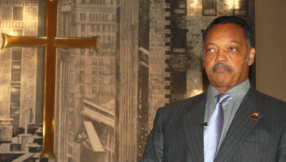Holy Week witnessed new levels of protest against America's culture of violence, specifically the State of Arkansas' line-up of eight people to execute in 10 days. The Easter killing spree was designed to make the most of the state's remaining supplies of midazolam, one of three drugs in a lethal execution cocktail, before its use-by date of April 30.
On Good Friday, hundreds of protesters gathered on the steps of the Arkansas Capitol and a petition of over 157,000 signatures was delivered to Republican governor Asa Hutchinson.

The grounds for protesting Arkansas' schedule are many.
Firstly, the risk of executing an innocent person was affirmed by one of Friday's protesters, Damien Echols, released in 2011 after 18 years on Death Row. One hundred and fifty-seven Death Row inmates have been exonerated to date and some have been executed then later proved innocent.
Secondly, the lethal drugs used in executions have come under recent legal challenges in several states for the suffering caused by ghastly botched executions in recent years.
On Maundy Thursday, two of the many pharmaceutical companies that have refused to supply drugs for execution filed a court brief claiming the drugs they supplied to Arkansas were obtained under false pretences, supposedly for medical purposes.
Other states have found ways to circumvent the reputable drug companies' ban. Ohio, which witnessed the lengthy, suffocating death of Dennis McGuire in 2014 and the two-hour torturous attempt to inject Romell Broom in 2009, passed a law last year guaranteeing secrecy for any supplier or compounding pharmacy supplying killer drugs.
Thirdly, objections to the death penalty have been raised on behalf of the executioners. On Wednesday, 23 former corrections officials from different States wrote to Arkansas Governor Hutchinson urging him to halt the killings, on the grounds that committing serial executions causes considerable mental trauma.
The State had even resorted to asking for volunteers from the Rotary Club to initiate some of the executions, to take the strain off prison staff. They had no volunteers, even from professed death penalty supporters.
By Easter Monday, Arkansas' hit list had gone down from eight to five. A parole board recommended clemency for Jason McGehee, who had spent 19 years on Death Row for a violent crime at age 19, following a severely abused childhood. The Governor does not have to accept the board's recommendation but it at least delays the issue until after the lethal drugs run out at the end of the month.
A stay of execution was granted for Bruce Ward based on his mental disability. Then Don Davis – who had already been given his final meal in the execution unit – was granted a last minute appeal by the US Supreme Court due to his 'organic brain damage, intellectual disability, head injuries, fetal alcohol syndrome and other severe mental health conditions'.
The mental health issue was further grounds for the Good Friday protests. Arkansas, which executed a man with schizophrenia in 2004, is one of seven states facing the introduction of a new bill to prohibit the death penalty for people suffering serious mental illness at the time of their crime.
In theory, it is already unconstitutional to execute someone with mental illness but many are not diagnosed until they are in prison, and according to one Death Row inmate, usually the State 'medicates them, says they're OK now, then kills them'.
It is already illegal (following the 2002 Atkins ruling) to execute someone with intellectual disability but states define disability in their own way. Texas has just been ordered by the US Supreme Court to relinquish outdated methods of assessing intellectual disability based on IQ tests and ignoring other data, a practice mirrored by other States.
There are also ongoing protests from forensic scientists regarding the use or misuse of forensic evidence to convict people, and the new Attorney General's proposal to remove review of forensic procedures from the scientific community is causing dismay.
Innocence Projects and attorneys for a number of Death Row inmates claim that their clients' convictions were based on uncorroborated forensic claims, junk science or improperly analysed DNA results.
And lastly, but significantly, protesters are challenging the myth that executing the perpetrator of violent crime constitutes justice, 'closure' or rightful revenge for victims' families.
Among the growing army of Americans joining the protests against state-sanctioned violence are family members of victims, who do not want the last memorial of their loved ones to be another gruesome death.
Easter is a reminder, if Christians ever need one, that redemption does not preclude even the gravest offenders and that – surely – one crucifixion is enough.
For more information see Murder Victims' Families For Reconciliation and Journey of Hope – From Violence to Healing.
An Ohio execution survivor's story can be seen on YouTube.













